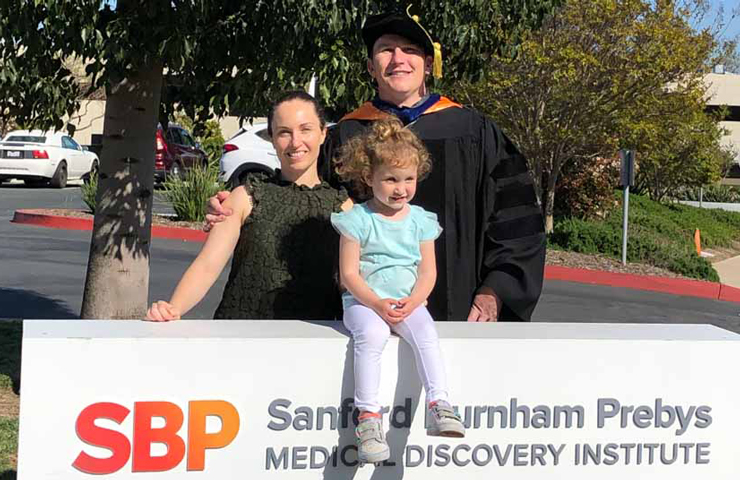When Clyde Campbell was 6 years old, his life changed overnight.
“I went to sleep, and everything was completely normal. But when I woke up, my knee had swollen to three times its usual size and was stuck in a 90-degree position. I learned I had juvenile rheumatoid arthritis, which then spread throughout my body—and no one knew why this had happened.”
Like the adult form, juvenile rheumatoid arthritis occurs when the immune system attacks healthy tissue. But much remains unknown—including the initial trigger that causes the body to misfire—and treatments are limited. This mystery sparked Campbell’s interest in science and desire to understand the ‘why’ behind disease—and thus create better medicines.
After obtaining a bachelor’s degree in molecular biology from UC San Diego, Campbell applied to Sanford Burnham Prebys’ Graduate School in hopes of working with his scientific hero, Duc Dong, PhD, assistant professor in the Human Genetics Program.
“When I completed my work at UC San Diego, everyone spoke highly of Dr. Dong and the thoroughness of his science. I knew very early on that I wanted to work with him,” says Campbell. “Sanford Burnham Prebys’ graduate school was attractive to me because the program allows you to start working with your PhD advisor right away—so I met with Dr. Dong and began my research.”
Last month, Campbell completed his doctorate, the 40th PhD awarded by the Graduate School. His thesis, completed under Dong’s guidance, demonstrated his success in reprogramming developing cells within a zebrafish (mesoderm- and ectoderm-derived cells) into the cells that become the pancreas (pancreatic progenitors), an important advance for people with type 1 diabetes (insulin is released from cells in the pancreas). Current cell-based treatments rely upon cadaver-sourced cells, which are effective but are unable to meet patient demand.
Campbell will carry his training and knowledge of cellular differentiation to Iowa State University, where he’s accepted a position as an adjunct associate professor. There, he will continue his regenerative medicine work, with a new focus on blood cell differentiation. This work could lead to treatments for children with leukemia and people battling other blood disorders. As a father to a 3-year-old daughter, his research now takes on special meaning.
“As a society, one of the most important things we can do for future generations is impart new knowledge. With research comes powerful insights—which could lead to cures. One day, I hope no child or adult will have to go through my experience.”
Learn about Sanford Burnham Prebys’ Graduate School.
Check out our upcoming SBP Insights event, held on June 20, 2019, which features a doctor, scientist and patient discussing rheumatoid arthritis and other autoimmune diseases.
Interested in keeping up with our latest discoveries, upcoming events and more? Subscribe to our monthly newsletter, Discoveries.
